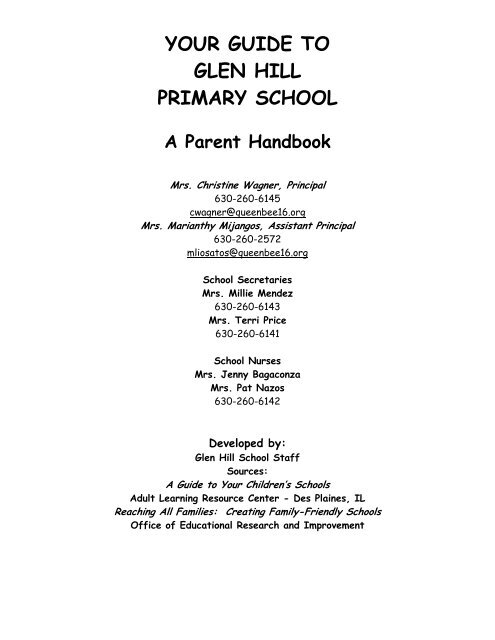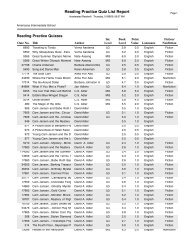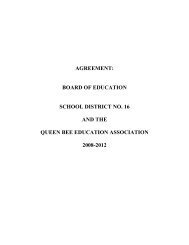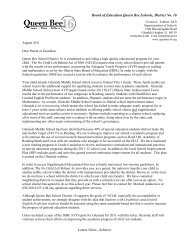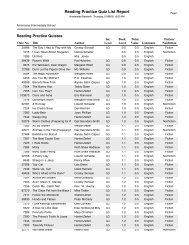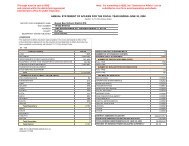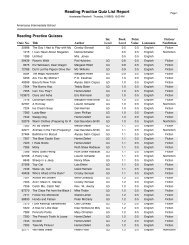your guide to glen hill primary school - Queen Bee Schools, District 16
your guide to glen hill primary school - Queen Bee Schools, District 16
your guide to glen hill primary school - Queen Bee Schools, District 16
Create successful ePaper yourself
Turn your PDF publications into a flip-book with our unique Google optimized e-Paper software.
Dear Parent or Guardian:Welcome <strong>to</strong> Glen Hill Primary School! This handbook will give youimportant information about Glen Hill School. The information inthis handbook is detailed information about our policies andprocedures. Parents and <strong>school</strong>s are partners in the education ofchildren. Both want children <strong>to</strong> succeed. When parents andfamilies get involved in education, their children do better in <strong>school</strong>and grow up <strong>to</strong> be more successful. By understanding how our<strong>school</strong> works, you can help <strong>your</strong> child succeed and do the best theycan.Sincerely,The Staff and Administration of Glen Hill School
Welcome <strong>to</strong> Glen Hill Primary SchoolThe mission of Glen Hill Primary Schoolis <strong>to</strong> provide a developmentally appropriate instructional environmentthat fosters academic, emotional, physical, and social growth whilestimulating the child’s natural love of learning.The vision of Glen Hill Primary School is as follows:The Vision of theLearnerWho we want ourstudents <strong>to</strong> be andwhat we want them <strong>to</strong>know when they leaveour <strong>school</strong>.Feeling respectedand unders<strong>to</strong>od.Achieve grade levelexpectations in allacademic andperformance areas.Be responsible,respectful andcaring individuals.The Vision of OurCultureThe environment wedesire for allstudents, staff andparents.Parent involvementis appreciated andexpected.All members of our<strong>school</strong> communityare appreciated andvalued.Listen <strong>to</strong> others andwork cooperatively<strong>to</strong>ward a commongoal.Provide a safe andsecure <strong>school</strong>.The Vision of OurTeaching andLearningThe educationalpractices we will put inplace for all learners.Acknowledgeacademic growth andachievements.Learning styles arenurtured in everyacademic andperformance area.Lessons are planned<strong>to</strong> take in<strong>to</strong> accountthe diverse needs ofevery student.
We, the Glen Hill Primary School community, establish these responsibilities inorder <strong>to</strong> foster the improvement of reading, language arts and math <strong>to</strong> support thesuccess of our students. We believe this can be done with the planned partnershipof parents, families, students, teachers, principals and community members.Parent's and Family's ResponsibilitiesWe will: Make sure our child attends <strong>school</strong> regularly, is on time, and is prepared <strong>to</strong>learn, with homework completed. Know what skills our child is learning in classes each day. Do activities at home that continue our child's classroom learning at home. Read with or <strong>to</strong> my child for 30 minutes each day, five days a week. Get a library card for our child, and encourage our child <strong>to</strong> bring readingmaterials from the library in<strong>to</strong> the home. Attend parent-teacher conferences and communicate frequently with ourchild's teacher, through notes and conversations, about how well our child isdoing.Student's ResponsibilitiesI will: Come <strong>to</strong> <strong>school</strong> on time and be ready <strong>to</strong> learn. Pay attention <strong>to</strong> my teachers, family, and tu<strong>to</strong>rs, and ask questions when Ineed help. Ask my family <strong>to</strong> read <strong>to</strong> me or with me for 30 minutes each day, five days aweek. Complete my homework on time in a thorough and legible way. Welcome help from my family on my homework and papers. Return signed homework and papers <strong>to</strong> <strong>school</strong>.Teacher's ResponsibilitiesWe will: Provide quality teaching and leadership <strong>to</strong> my students and their families. Communicate frequently with families and tu<strong>to</strong>rs about my students'progress and show them how they can help. Coordinate with other programs <strong>to</strong> make sure nightly assignments do notexceed time limits. Recognize that students are accountable for every assignment. Participate in meaningful professional development in how <strong>to</strong> teach, how <strong>to</strong>communicate with families, and how <strong>to</strong> work with tu<strong>to</strong>rs. Hold at least two parent-teacher conferences a year.
Principal and Associate Principal’s ResponsibilitiesWe will: Set high standards in all subject areas by providing a challenging curriculum. Report publicly on <strong>school</strong> wide assessment scores, and help teachers andparents <strong>to</strong> understand how adopting high standards can lead <strong>to</strong> theimprovement of scores. Allocate resources <strong>to</strong> ensure high standards are met. Hold workshops on the Illinois Learning Standards and ways <strong>to</strong> set thestandards in<strong>to</strong> practice at <strong>school</strong> and at home. Provide reading materials and training so that parents can help their childrenlearn <strong>to</strong> read. Establish training workshops for tu<strong>to</strong>rs and families <strong>to</strong> work with children onhome activities. Provide special benefits <strong>to</strong> teachers that meet with families and tu<strong>to</strong>rs inextended-learning programs. Welcome and involve all families, especially those with low literacy skills orlimited English proficiency, or those who have not been involved in the <strong>school</strong>before.Community Member's ResponsibilitiesWe will: Make a commitment <strong>to</strong> help all children learn <strong>to</strong> read. Keep informed about the Illinois Learning standards and the performance of<strong>school</strong>s in my area. Find out more about my <strong>school</strong>'s literacy and learning standards. Contact business and other community organizations that could donateresources <strong>to</strong> local <strong>school</strong>s <strong>to</strong> help them meet high standards in reading andmath. Volunteer <strong>to</strong> tu<strong>to</strong>r students who need help in reading, language arts skillsand math or support and participate in training for tu<strong>to</strong>rs and otherpartners. Help <strong>to</strong> open other facilities where children can go after <strong>school</strong> <strong>to</strong> read withsomeone or <strong>to</strong> do their homework. Build a community network of concerned adults, consisting of communityleaders, writers, journalists, and others who can be helpful <strong>to</strong> discuss andpublicize local literary issues.
Chapter 1: The School Calendar and the School DayHow long are my children in <strong>school</strong> each day?Students in grades 1 – 3 begin their <strong>school</strong> day at 8:15 A.M. School ends forgrades 1 – 3 at 3:00 PM. Morning kindergarten classes begin at 8:15 A.M. and endat 10:50 A.M. Afternoon kindergarten classes begin at 12:30 P.M. and end at 3:00PM.Every Monday is an Early Release Day our schedule is as follows;Students in grades 1 – 3 begin their <strong>school</strong> day at 8:15 A.M.School ends for grades 1 – 3 at 2:20 PM.Morning kindergarten classes begin at 8:15 A.M. and end at 10:20 A.M.Afternoon kindergarten classes begin at 12:20 P.M. and end at 2:20 PM.When does my child eat lunch?‣ Students in grades 1 through 3 will eat lunch at <strong>school</strong>. Students have theoption of bringing a lunch <strong>to</strong> <strong>school</strong> on a daily basis. We do offer a hot lunchprogram. The lunch hour begins at 11:35 AM and ends at 12:35 PM. Parentsbringing lunches for their child should deliver lunches <strong>to</strong> the <strong>school</strong> officeBEFORE 11:30 AM.Lunchroom Rules:‣ Children will be escorted <strong>to</strong> the lunchroom by their lunch moni<strong>to</strong>rs.‣ Children will be assigned tables by classrooms.‣ Children will be dismissed from the lunchroom when their tables and floorare clean.‣ Children will remain seated until excused.‣ Children will talk in “low voices” while eating.‣ Children will be respectful <strong>to</strong> fellow students, lunchroom personnel andsupervisors.‣ Children will remain seated in the lunchroom.While fast food may be a good alternative <strong>to</strong> making a lunch, fast food lunches arediscouraged from being brought <strong>to</strong> <strong>school</strong> on a daily basis. If you do bring a fastfood lunch, please remember that soda is not allowed. If you're helping <strong>your</strong> childpack a lunch, start by brains<strong>to</strong>rming foods and snacks that he or she would like <strong>to</strong>eat. The following are <strong>guide</strong>lines for packing a healthy lunch for <strong>your</strong> child.
HELPFUL HINTPack a healthy lunch for <strong>your</strong> child.A healthy lunch contains:Lower-fat deli meats, such as turkeyWhole-grain breads (wheat, oat, multigrain)Light mayonnaise or mustardBaked chips, air-popped popcorn, trail mix, veggies and dipFruit in natural juices or fresh fruitTrail mix, yogurt, or homemade baked goods such as oatmeal cookies or fruit muffinsMilk, water, or 100% fruit juice(children may not bring soda <strong>to</strong> <strong>school</strong> for lunch)What does my child do at recess?All children have ½ hour of recess daily either before or after their lunch.Playground and game rules are for the safety and fairness of all our students.These rules will be published and explicitly taught during the first few sessions ofPhysical Education (PE). Personal equipment (balls, jump ropes, etc) is notallowed at <strong>school</strong>. Equipment brought from home will be confiscated and held inthe office until June. The <strong>school</strong> will provide all of the equipment that is neededfor play. Playground equipment is not given out before <strong>school</strong>, as this promoteschildren coming <strong>to</strong> <strong>school</strong> before adult supervision is available.
In addition <strong>to</strong> the playground and game rules, we expect our students <strong>to</strong> abide bythe following:‣ Excellent sportsmanship is expected from students at all times duringgames played at recess time.‣ Students will follow directions of supervisors, the first time given, withno argument.‣ Walking or running through a game area is prohibited.‣ Students are <strong>to</strong> stay in the supervised, assigned areas during allrecesses. The parking lot is off limits. Students must not climb fences.‣ Students are <strong>to</strong> "S<strong>to</strong>p, Look and Listen" if they hear the whistle from ayard supervisor. Immediately obey any direction given after the whistle.‣ On slides, children must go down one at a time, feet first.‣ On swings, standing or jumping off is not allowed.‣ There are no water guns or electronic <strong>to</strong>ys allowed at <strong>school</strong> or on theplayground.‣ Walking in the playground areasAt the end of recess, the lunch moni<strong>to</strong>rs on yard duty will blow their whistle. Allstudents are <strong>to</strong> s<strong>to</strong>p what they are doing. When the lunch moni<strong>to</strong>r blows thewhistle a second time, students are <strong>to</strong> walk <strong>to</strong> their lines. This prevents accidentsthat can happen when 200 students are running <strong>to</strong> line up.Are there holidays or special days when children are not in <strong>school</strong>?Our <strong>school</strong> has a two-week winter break from mid December through earlyJanuary. We also have a one-week break in spring, usually during the end of March.Glen Hill School is closed for other days <strong>to</strong>o. There are special meetings for ourteachers on Institute Days and School Improvement Days. Every Monday allstudents go home early. This is called an Early Release Day. On student earlyrelease days, classes begin at 8:15 and end at 2:20. Morning kindergarten classesare held from 8:15A.M. <strong>to</strong> 10:20 A.M. Afternoon kindergarten classes are heldfrom 12:20 P.M. <strong>to</strong> 2:20 P.M.If <strong>your</strong> child needs <strong>to</strong> stay home for a religious holiday when <strong>school</strong> is open, callthe attendance phone (630-260-6142) <strong>to</strong> report <strong>your</strong> child’s absence.
School Closings: Sometimes <strong>school</strong>s close when the weather is VERY bad. Thereare many ways <strong>to</strong> find out if our <strong>school</strong> is closed.You can visit our website at www.queenbee<strong>16</strong>.orgYou can listen <strong>to</strong> the following radio stations:WGN 720AMWBBM 78AMZone 94.7FM.The following TV stations will also carry <strong>school</strong> closings:CBS – 2NBC – 5ABC - 7WGNFOXCLTVYou may also call: 312-222-SNOW or check online at www.EmergencyClosings.comIF GLEN HILL SCHOOL IS NOT LISTED – WE ARE OPEN!Please do not call the <strong>school</strong>.HELPFUL HINTKeep our <strong>school</strong> calendar on <strong>your</strong> refrigera<strong>to</strong>r or by <strong>your</strong> phone.
Chapter 2: Getting <strong>to</strong> SchoolHow can children go <strong>to</strong> and from <strong>school</strong> each day?Children who live close <strong>to</strong> Glen Hill usually walk <strong>to</strong> <strong>school</strong>. Some parentsdrive their children <strong>to</strong> <strong>school</strong>. Children who walk or are driven <strong>to</strong> <strong>school</strong> mustarrive no earlier than 8:00 AM and no later than 8:15 A.M. This is a safety issueand our staff is not available <strong>to</strong> supervise students who do not observe this timeschedule. Children are not allowed in the hallways and classrooms once <strong>school</strong> hasended. Parents must make arrangements for their children before and after<strong>school</strong>.‣ When dropping off or picking up students, please do not block the parkinglot and do not use the drive through/bus lane. The drive through/bus laneis only for <strong>school</strong> busses and emergency vehicles.It is important for all cars <strong>to</strong> stay in a single line so children do not have<strong>to</strong> walk around the cars. Please do not leave <strong>your</strong> cars parked in thedriveway unattended. The Glendale Heights Police will cite cars that areparked in the bus turnaround or the marked handicap space.‣ Do not drop off children on Bloomingdale Road, this is very dangerous andthe Glendale Heights Police will ticket you.‣ Children must get out of their cars from the passenger side along thesidewalk.Children who live farther than 1½ miles from <strong>school</strong> will take the bus. Bustransportation is free for these students. If <strong>your</strong> child takes the <strong>school</strong> bus, youneed <strong>to</strong> know:‣ The number/animal name of the <strong>school</strong> bus‣ The place <strong>your</strong> child gets on the bus‣ The time <strong>your</strong> child gets on the bus‣ The place <strong>your</strong> child gets off of the bus‣ The time <strong>your</strong> child gets off of the busChildren must arrive at the bus s<strong>to</strong>p 10 minutes before the pick-up time. Allchildren riding the bus are expected <strong>to</strong> get on and off at the same bus s<strong>to</strong>p everyday. All pre<strong>school</strong> and kindergarteners must be picked up at the drop off s<strong>to</strong>p
or will be returned <strong>to</strong> Glen Hill School. If <strong>your</strong> child is not going <strong>to</strong> ride the bushome from <strong>school</strong> on a certain day the <strong>school</strong> must be contacted before 2:30 P.M.Cars driving children <strong>to</strong> <strong>school</strong> must pull in<strong>to</strong> the north parking lot and follow theorange cones. Students should exit on the passenger side of the car only. Two <strong>to</strong>three cars may drop off children simultaneously. Only right hand turns on<strong>to</strong>Bloomingdale Road may be made when exiting during drop off and pick up.HELPFUL HINTTo avoid the crowd in the parking lot,use Glen Hill Drive fordrop-off and pick-up.
Chapter 3: School ProceduresGood attendance is important for student success. State law requires thatattendance be regular except for illness. It is important that students be promptas tardiness disrupts learning. If <strong>your</strong> child misses <strong>school</strong>, please call the office by9:00 AM (630-260-6142) and let us know why he/she is absent.You may request homework from the teacher after the second day of an extendedabsence. If you request homework, please call the office before 9:00 AM. You maythen pick up the homework between 3:00 and 3:30 PM the day of <strong>your</strong> request.What should I do if my child is sick?If <strong>your</strong> child is sick, they should stay home. Sometimes parents send a sick child<strong>to</strong> <strong>school</strong> because they have <strong>to</strong> go <strong>to</strong> work and can’t stay home with the child.However, a sick child makes other children sick. If <strong>your</strong> child is staying homefrom <strong>school</strong>, you must call 630-260-6142 before 9:00 AM.Do not send <strong>your</strong> child <strong>to</strong> <strong>school</strong> if:‣ The child has a fever of 99.6°F or higher (The child must be fever free for24 hours <strong>to</strong> return <strong>to</strong> <strong>school</strong>).‣ The child vomits the night before or in the morning before <strong>school</strong>‣ The child is coughing excessively.‣ The child has a skin rash or sores.‣ The child has lice (Parents must wash the child’s hair with a special shampooand remove the lice eggs from the hair. After this, the child can go back <strong>to</strong><strong>school</strong>).‣ The child has chicken pox (The child must stay home for 7 days after thechicken pox begins).‣ The child has strep throat (The child can go back <strong>to</strong> <strong>school</strong> after taking anantibiotic for 24 – 48 hours).‣ The child has pinkeye (The child can go back <strong>to</strong> <strong>school</strong> after taking anantibiotic for 24 – 48 hours).We will send a letter <strong>to</strong> parents if a student in <strong>your</strong> child’s classroom has acontagious illness such as chicken pox, strep throat, or lice. This letter will tell youwhat <strong>to</strong> look for so you will know if <strong>your</strong> child catches the illness.
What if my child must take medicine in <strong>school</strong>?Parents should not send medicines <strong>to</strong> <strong>school</strong> with children unless it is absolutelynecessary. Children are not allowed <strong>to</strong> take medicine by themselves at <strong>school</strong>. Ifit is necessary for a child <strong>to</strong> take a medication in <strong>school</strong>, parents must provide the<strong>school</strong> with a doc<strong>to</strong>r’s note. A doc<strong>to</strong>r’s note is also needed <strong>to</strong> stay in for recess ornot participating in physical education.Parents should send medicine <strong>to</strong> <strong>school</strong> in the original pharmacy bottle, not in a bagor an envelope. The bottle must have a label with:‣ The child’s name‣ The doc<strong>to</strong>r’s name‣ The name of the medicine‣ How much and when <strong>to</strong> give the medicineThe child must come <strong>to</strong> the nurse’s office <strong>to</strong> take the medicine.Who should I call if I have questions about my child’s health?If you have questions about <strong>your</strong> child’s health at <strong>school</strong>, call our <strong>school</strong> nurse at630-260-6142. If you are reporting an absence, you should also call this number.How can the <strong>school</strong> reach me if my child becomes sick at <strong>school</strong> orhas an accident?If <strong>your</strong> child becomes sick or has an accident at <strong>school</strong>, the <strong>school</strong> will call you orthe person listed on the Student Information Form (SIF). It is important that oursecretaries be informed if <strong>your</strong> emergency information changes. It is importantfor us <strong>to</strong> know:‣ The telephone number where you are during the day‣ The name and telephone number of a relative or close friend‣ The name and telephone number of <strong>your</strong> child’s doc<strong>to</strong>r or clinic‣ Any special health needs <strong>your</strong> child hasIf this information changes at any time, contact our secretaries in order forthem <strong>to</strong> update this information.
If my child must be late or absent from <strong>school</strong>, what should I do?Late for <strong>school</strong>: Children should not be late for <strong>school</strong>. Children should arrivebefore 8:15 A.M. If children come late, the teacher will mark them late or tardy.You should call us at 630-260-6142 if <strong>your</strong> child is going <strong>to</strong> be late. Your child willstill be marked tardy even after <strong>your</strong> call.A student who is tardy must check in at the office and receive a pass beforegoing <strong>to</strong> class. The following tardy policy is:• Tardy 1: Warning• Tardy 2: Teacher contacts parent• Tardy 3: Teacher refers name <strong>to</strong> the office and parent will be notified.• Tardy 4: Student's name is referred <strong>to</strong> Project VISAThis policy will start over at the start of each quarter. It is imperative thatstudents arrive at <strong>school</strong> on time in order <strong>to</strong> maximize learning opportunities.Absent from <strong>school</strong>: When <strong>your</strong> child can’t come <strong>to</strong> <strong>school</strong>, call the <strong>school</strong> everyday in the early morning before <strong>school</strong> starts. Glen Hill School has an answeringmachine where parents can leave a message.When you call our <strong>school</strong> (630-260-6142), you should say the following information:‣ Your child’s name‣ Your child’s grade and teacher’s name‣ Why <strong>your</strong> child is going <strong>to</strong> be absent‣ Your name and phone numberSometimes parents take their children out of <strong>school</strong> during the day before <strong>school</strong>is over. They may have <strong>to</strong> take their child <strong>to</strong> the doc<strong>to</strong>r or dentist during the day.If you want <strong>to</strong> take <strong>your</strong> children out of <strong>school</strong>, you must write a note <strong>to</strong> theteacher. Your child should take the note <strong>to</strong> the teacher in the morning. The noteshould say:‣ Why you are taking <strong>your</strong> child out of <strong>school</strong>‣ What time you will take <strong>your</strong> child out of <strong>school</strong>‣ The name of the person picking up <strong>your</strong> childWhen it becomes necessary <strong>to</strong> check a student in<strong>to</strong> <strong>school</strong> late or for an earlydismissal, please sign <strong>your</strong> child in/out at the office. Please do not pick up <strong>your</strong>child directly from the classroom, lunchroom or playground. Please do not park inthe bus lane.Make-up Work: Children who are absent from <strong>school</strong> due <strong>to</strong> illness must do the<strong>school</strong>work and homework they miss. If a child is absent from <strong>school</strong> due <strong>to</strong> illness
for more than 2 days, you may call <strong>to</strong> schedule a time <strong>to</strong> pick up the make-up work.You or <strong>your</strong> child’s friend can go <strong>to</strong> the <strong>school</strong> office <strong>to</strong> get the make-up work.Family Vacations: Parents should not take their children on vacations during<strong>school</strong> time. Parents should take family vacations during <strong>school</strong> breaks. The Boardpolicy states: “Removing students from <strong>school</strong> for vacation trips isdiscouraged. Instructional staff are not required <strong>to</strong> provide work <strong>to</strong> becompleted by students who are away from <strong>school</strong> on vacation during the <strong>school</strong>term. Because the Board of Education discourages vacation trips during thenormal <strong>school</strong> year, absences of this nature will be considered unexcusedabsences, and no make up work will be permitted.” There are no penalties,and/or zeros issued for work missed during a vacation.Can I visit my child’s <strong>school</strong>?Parents are welcome <strong>to</strong> visit our <strong>school</strong>. We ask that you contact <strong>your</strong> child’steacher by phone call, written note or email <strong>to</strong> arrange a time for <strong>your</strong> visit. Whenyou visit, you must first go <strong>to</strong> the office <strong>to</strong> sign in and for a visi<strong>to</strong>r’s pass. You canvisit <strong>your</strong> child’s classroom, but we ask that you do not talk <strong>to</strong> the teacher duringthe class. If you would like <strong>to</strong> talk <strong>to</strong> the teacher, we ask that you make anappointment for a private conference.Do I have <strong>to</strong> pay for anything in the <strong>school</strong>?There are additional fees for some <strong>school</strong> activities or materials:Field Trips: Sometimes students go on field trips <strong>to</strong> museums, the zoo, and otherplaces. Parents must sign a permission slip before the child can go on the fieldtrip. There is usually a small fee for the trip, which covers the cost of the bus andadmissions. Parents are usually offered a chance <strong>to</strong> volunteer <strong>to</strong> go on the fieldtrip <strong>to</strong> help the teacher watch the children on the trip.Magazine Subscriptions: All grade levels use educational magazines in theirclassrooms. Teachers will send home a letter in the beginning of the year statingthe cost of the magazine subscription. Children may take this magazine home whenthey are finished using it in class.
Who can I ask about <strong>school</strong> procedures if I have a question?You can call the <strong>school</strong> secretaries, Mrs. Price or Mrs. Mendez. Mrs. Mendez alsospeaks Spanish. You may also call our secretaries and ask <strong>to</strong> leave a message for<strong>your</strong> child’s teacher. Mrs. Wagner, our Principal, or Mrs. Mijangos, our AssistantPrincipal, is also available <strong>to</strong> answer any questions you may have.Mrs. Wagner 630-260-6145 cwagner@queenbee<strong>16</strong>.orgMrs. Mijangos 630-260-2572 mliosa<strong>to</strong>s@queenbee<strong>16</strong>.orgMrs. Mendez 630-260-6143 mmendez@queenbee<strong>16</strong>.orgMrs. Price 630-260-6141 tprice@queenbee<strong>16</strong>.orgNurse’s Office 630-260-6142 pnazos@queenbee<strong>16</strong>.org
Chapter 4: Instructional ProgramsWhat subjects do my children study in elementary <strong>school</strong>?The <strong>primary</strong> <strong>school</strong> curriculum is the subject’s children study in <strong>school</strong>. In our<strong>school</strong>, children study many different subjects:SubjectMinutes per WeekReading, Writing and Spelling 850Math 300Science 90Social Studies 90PE and Health 90Art 45Music 45HELPFUL HINTKeep a folder for all <strong>school</strong> documents. Often children bring home <strong>school</strong>information for you in their backpacks. This folder can hold information about the<strong>school</strong> calendar, bus schedules, <strong>school</strong> vacations, holidays, and other materials andannouncements sent from our <strong>school</strong>.If my child has learning problems or special needs, what can the<strong>school</strong> do <strong>to</strong> help?Special education is a program for students with certain problems in <strong>school</strong>. Thesestudents may have problems seeing, hearing, talking, walking, learning or behavingin class. Our district provides special education services for disabled students <strong>to</strong>help them succeed in <strong>school</strong>. If <strong>your</strong> child has special learning needs:‣ Ask about the services available in our district.‣ Tell us what kind of special help <strong>your</strong> child needs at <strong>school</strong>.‣ Bring or ask for an interpreter at meetings if you do not speak English.‣ Keep all important documents and letters our staff sends <strong>to</strong> you.Are there special programs if my child has talents or abilities?We have programs available within the <strong>school</strong> that offer more challenging andcreative work for children who have special abilities.
Chapter 5: Discipline ProgramWhat is P.B.I.S?Our discipline plan is based on Positive Behavioral Interventions and Support—PBIS. Expectations will be explained <strong>to</strong> <strong>your</strong> child during the first week of <strong>school</strong>.Our system has four components:1. A matrix of behavioral expectations2. Lesson plans used <strong>to</strong> teach students the expectations3. Dolphin Tickets, weekly, monthly and quarterly rewards that are used as anacknowledgment/reinforcement system4. Office Discipline Referral FormsThe Glen Hill staff has come up with the following three rules that we expecteveryone in our <strong>school</strong> community <strong>to</strong> abide by:BE HERE, BE READY!BE RESPECTFUL!BE SAFE!It is our goal <strong>to</strong> make the understanding of these rules as clear and easy forchildren as possible. In a positive manner, the matrix tells children what <strong>to</strong> do andhow <strong>to</strong> behave in order <strong>to</strong> abide by these rules in the various areas of the <strong>school</strong>.Portions of the matrix are posted in each classroom and in areas around the <strong>school</strong>.Another component of our system is the use of consistent positive reinforcement.All staff members who observe children following the above rules will issue aDolphin Ticket. ALL children should be receiving tickets for demonstrating goodbehavior. Research shows us that positive reinforcement is one of the best ways<strong>to</strong> not only change poor behavior, but also <strong>to</strong> maintain appropriate behavior.Children will have various opportunities <strong>to</strong> redeem their tickets for rewards. Atthe end of the <strong>school</strong> month, student can redeem 5 or more tickets for a trip <strong>to</strong>Glen Hill’s Treasure Chest. The Glen Hill staff is committed <strong>to</strong> making sure thatALL children who demonstrate positive behaviors will receive Dolphin tickets. Allstudents participate in a <strong>school</strong>-wide celebration on a monthly basis.Even with teaching children our expectations, offering pre-corrections orreminders for the expected behaviors, children will still misbehave. For theseinstances the Glen Hill staff has designed the Office Discipline Referral Form.This form is in line with the <strong>District</strong> Behavior Code, and divides infractions in<strong>to</strong>MINORS and MAJORS. Before a child receives a MINOR or a MAJOR, teacherswill manage the situation through regular classroom management. If the teacher isunable <strong>to</strong> do so a form will be filled out. After the 3 rd MINOR offense, the child
will be issued an Office Referral, MAJOR. At that point, the child is sent <strong>to</strong> theoffice. Parents will be notified immediately if there is a MAJOR offense.The term bullying means any severe or pervasive physical or verbal act or conduct,including communications made in writing or electronically, directed <strong>to</strong>ward astudent that has or can be reasonably predicted <strong>to</strong> have the effect of one or moreof the following:1. Placing the student in reasonable fear of harm <strong>to</strong> the student’s person orproperty.2. Causing a substantially detrimental effect on the student’s physical or mentalhealth.3. Substantially interfering with the student’s academic performance.4. Substantially interfering with the student’s ability <strong>to</strong> participate in or benefitfrom the services, activities, or privileges provided by a <strong>school</strong>.Bullying will not be <strong>to</strong>lerated at Glen Hill. For further information of how bullyingwill be dealt with at the district/<strong>school</strong> level please see Board Policy 7:180 of theSchool Board Policy. You can locate the Board Policy on the district websitewww.queenbee<strong>16</strong>.org.Your help with PBIS is imperative. You can assist the <strong>school</strong> staff in a number ofways:‣ Please remind <strong>your</strong> child of our rules each day before he/she leaves for<strong>school</strong>. BE HERE, BE READY BE RESPECTFUL BE SAFE‣ Help <strong>your</strong> child BE HERE, BE READY by helping him/her get up and be at<strong>school</strong> on time. Children should arrive between 8:00 and 8:15. School beginsat 8:20. Students who are tardy are disruptive <strong>to</strong> everyone, and often havea poor start <strong>to</strong> the <strong>school</strong> day.‣ After <strong>school</strong>, ask <strong>your</strong> child how many Dolphin Tickets he/she earned andfind out what behaviors were exhibited in order <strong>to</strong> earn these tickets.Please offer <strong>your</strong> child extra praise and reinforcement for these behaviors.
Chapter 6: Parents’ Role in Their Children’sEducation and LearningWe want you <strong>to</strong> be involved in <strong>your</strong> children’s education. Parents can be involved inour <strong>school</strong> in many ways. They can:‣ Talk <strong>to</strong> our administra<strong>to</strong>rs and teachers‣ Attend <strong>school</strong> activities‣ Assist in making decisions about our <strong>school</strong>‣ Volunteer at our <strong>school</strong>How can I learn about my child’s <strong>school</strong>?Prompt, open communication between home and <strong>school</strong> is essential. In order <strong>to</strong> giveparents adequate time in meeting with staff, we ask that parents schedule aspecific time with teachers <strong>to</strong> discuss their child's program.Individual parent/teacher conferences will be scheduled two times during the yearand as needed throughout the course of the year. Report cards are intended <strong>to</strong>give the parents and students an indication of the student's growth anddevelopment in <strong>school</strong> subjects. They are issued two times per year for children ingrades K-2 and four times per year for children in third grade.Open Houses: This is a time <strong>to</strong> meet <strong>your</strong> child’s teacher, see their classrooms,and hear about what work <strong>your</strong> children will be doing throughout the year.Parent-Teacher Conferences: Individual parent/teacher conferences will bescheduled during November and February and as needed throughout the course ofthe year. This is a meeting held between parents and teachers. The teachermeets privately with each child’s parents <strong>to</strong> discuss the child’s progress orbehavior in the classroom. Parents can also ask for a conference any time there isa problem. Parents can call the teacher or write a note or email <strong>to</strong> the teacherasking for a conference.Written Materials: Flyers are sent home with the children. The following areexamples of materials that we send home:‣ School calendars that list activities, holidays or <strong>school</strong> programs‣ Newsletters telling what has happened in the classrooms and <strong>school</strong>‣ Permission forms for students <strong>to</strong> take field trips‣ Announcements for <strong>school</strong> meetings, conferences, <strong>school</strong> closings and otherevents
Phone Calls and the Internet: When calling the teacher, please note that theteacher is responsible for providing instruction during the <strong>school</strong> day and may notget back <strong>to</strong> you before the end of the day. All teachers can also be reached by e-mail. You may access this website at: www.queenbee<strong>16</strong>.org. The website alsoincludes information about <strong>school</strong> programs, calendars and parent resources.Since the delivering of messages may cause a disruption <strong>to</strong> the classroom, theoffice cannot guarantee <strong>to</strong> deliver messages <strong>to</strong> students except in cases ofemergency. A student may NOT receive a telephone call unless it is an emergency.Please NEVER go directly <strong>to</strong> the classroom <strong>to</strong> give <strong>your</strong> child a message. All parentsmust go <strong>to</strong> the office.Parents are encouraged <strong>to</strong> call our <strong>school</strong> whenever they have a question and ask <strong>to</strong>speak <strong>to</strong> their child’s teacher or our principal. If you wish <strong>to</strong> visit our <strong>school</strong>,please call the <strong>school</strong> first <strong>to</strong> make an appointment.How do I know how my child is doing in <strong>school</strong>?Report Cards: Report cards are intended <strong>to</strong> give the parents and students anindication of the student's growth and development in <strong>school</strong> subjects. Reportcards list each subject <strong>your</strong> child studies. For each subject, there is a rating orgrade.Parents receive their children’s report cards two times a year in Kindergartenthrough second grade. Children in third grade receive a report card four times peryear. Children will bring their report cards home. When you receive the reportcard, you will need <strong>to</strong> sign the report card envelope. The children return thereport card envelope <strong>to</strong> <strong>school</strong>.Grades: Our district uses letter grades beginning in third grade. These gradestell parents how their children are doing in each subject. A, B, C, and D are passinggrades. The grade F means that the child did not pass the subject. Grades arebased on <strong>school</strong>work, quizzes, and tests.Midterm Reports: Glen Hill School sends midterm reports home <strong>to</strong> students inthird grade who are in danger of receiving an F in any subject.What can I do at home <strong>to</strong> help with my child’s learning?Successful students come <strong>to</strong> <strong>school</strong> ready <strong>to</strong> learn and have good study habits.There are many ways parents can help their children do well in <strong>school</strong>. Doing sotells <strong>your</strong> child that learning is important and that he is important. Here areimportant things you can do <strong>to</strong> help <strong>your</strong> child’s learning:
Read <strong>to</strong> Your Child: If you’re like most parents, finding time <strong>to</strong> read with <strong>your</strong>child can be a challenge. With a little planning, you can make the time that youspend reading with <strong>your</strong> child one of the best parts of <strong>your</strong> day.‣ Plan ahead. When you go <strong>to</strong> the library, choose five books for the week.Each day pick a different book <strong>to</strong> read.‣ Talk about books. At breakfast, talk about the books you read with ourchild the day before. It will help <strong>your</strong> child know that reading is special.‣ Make up a s<strong>to</strong>ry. There are some days that you’re on the run and don’t havetime <strong>to</strong> read. Make up a s<strong>to</strong>ry instead.Talking about Schoolwork: Parents should ask their children each day, “How was<strong>school</strong> <strong>to</strong>day?” “Tell me about something exciting that you did <strong>to</strong>day.” “Do youhave any homework <strong>to</strong>night?” We want you <strong>to</strong> discuss <strong>school</strong>work with <strong>your</strong> child.Encourage <strong>your</strong> child <strong>to</strong> share events, projects and graded papers with you.Helping with Homework: Homework is defined as assignments given <strong>to</strong> increase alllevels of a child's understanding or skill in a particular area of the curriculum.Homework will have a purpose and will be clearly unders<strong>to</strong>od by the student.Homework will be an extension and enrichment of the curriculum. It will have asone of its purposes the development of good study habits and self-reliance inworking independently. The assignments will be planned in terms of the child'sneeds, abilities and potentials.It is the responsibility of the child, parent and teacher <strong>to</strong> ensure that assignedwork is completed on time. It may be necessary <strong>to</strong> establish regular communicationprocedures between teacher and parent <strong>to</strong> assist individual students with theirresponsibilities.Children may be assigned homework <strong>to</strong>:‣ Read‣ Complete assigned homework‣ Complete unfinished or make-up work‣ Practice in various subject areas‣ Finish special assignments‣ Work on Book Reports‣ Review daily or returned work‣ Listen <strong>to</strong> parent/students read‣ Work with parents on specifically assigned tasks‣ Study for a quiz or a test
The length of homework assigned daily is based on <strong>your</strong> child’s grade level:‣ First grade = approximately 10 minutes per day‣ Second grade = approximately 20 minutes per day‣ Third grade = approximately 30 minutes per dayHere are some things you can do <strong>to</strong> help <strong>your</strong> children with their homework.Homework Time: Children have many daily activities such as chores, appointments,playtime, after <strong>school</strong> programs, and homework. You can help <strong>your</strong> childrenschedule a special time for homework. It is best if homework is done at the sametime every afternoon or evening, but not late in the evening. During homeworktime, you should turn off the television and video/computer games. Children need aquiet place <strong>to</strong> do their homework.It is very important <strong>to</strong> <strong>your</strong> child's health and education that he/she gets enoughrest and maintains a well balanced diet. We urge you <strong>to</strong> send healthy snacks with<strong>your</strong> children <strong>to</strong> eat at morning snack time and at lunch. Here are some general<strong>guide</strong>lines for the number of hours of sleep a child needs on average each night:Age Hours of Sleep per Night5 10 – 126 10 – 11.57 9.5 – 11.58 95 – 11.59 9.5 – 11.5Looking at Homework: You can look at the homework <strong>to</strong> see if it is neat and clean.Your children can explain their homework <strong>to</strong> you. Sometimes children see mistakeswhen they explain their homework.Problems with Homework: Sometimes children cannot finish their homeworkbecause they don’t understand it. If parents understand the homework, they canhelp their children. But parents should never do the homework for their children.
Many parents feel that they cannot help their children with homework. Sometimesparents don’t understand much English or don’t understand the subject. If parentscannot help their child with a homework problem, they should write a note or callthe child’s teacher. Parents can tell the teacher their child had a problem finishingthe assignment. Many times, children can get extra help with their homeworkassignments at <strong>school</strong> or during recess.Sometimes children don’t want <strong>to</strong> do their homework. They may find time <strong>to</strong> watchTV or play, but they never have time <strong>to</strong> do their homework. Our teachers will sendan “Oops” notice home <strong>to</strong> you if <strong>your</strong> child is not doing homework.Homework will not be assigned during a <strong>school</strong> break period. Homework assignedover the weekend is not encouraged at the <strong>primary</strong> <strong>school</strong>. Extra credit or makeupwork may be assigned during <strong>school</strong> breaks or on weekends. Recreational readingand learning is always encouraged and is not considered homework.School Supplies: Children need <strong>to</strong> bring <strong>school</strong> supplies <strong>to</strong> class. School supplylists are available in the office and on our website.Dress for the Weather: Make sure <strong>your</strong> children’s clothes are okay for theweather outside. For example, if it’s cold outside, they should wear warm clothessuch as coats, hats and gloves. Children go outside for recess on all days when theoutside temperature is above 20°F.Warm weather daysSnowy daysDress Code: Proper dress for <strong>school</strong> is important <strong>to</strong> <strong>your</strong> child’s learning. It isimportant <strong>to</strong> let <strong>your</strong> child know that there is dress for play and dress for <strong>school</strong>.Boys cannot wear hats inside and girls are not allowed <strong>to</strong> wear bandanas. Boys arenot allowed <strong>to</strong> wear tank <strong>to</strong>ps and girls are not allowed <strong>to</strong> wear halter <strong>to</strong>ps. If <strong>your</strong>child is not dressed properly for <strong>school</strong>, they will be asked <strong>to</strong> put on their gym orart shirt.YES YES YES YES NO NO UNSAFE UNSAFE
What special activities can I attend at Glen Hill School?We invite parents <strong>to</strong> special <strong>school</strong> activities. These activities give teachers,parents and children a time <strong>to</strong> get <strong>to</strong> know each other. Some activities thatparents are invited <strong>to</strong> <strong>school</strong> <strong>to</strong> attend with their children are:‣ Musical presentations <strong>to</strong> see <strong>your</strong> child act, sing or play an instrument.‣ Family Nights where children and their family can complete activities<strong>to</strong>gether.What are some ways I can volunteer at Glen Hill School?Visi<strong>to</strong>rs and Classroom Volunteers are welcome <strong>to</strong> our classrooms. To minimizepotential interruptions <strong>to</strong> learning, we ask that the following <strong>guide</strong>lines be followed:‣ Schedule the visit ahead of time with the teacher.‣ Time and length of stay will be at the discretion of the teacher.‣ Sign in and out in the office and wear a visi<strong>to</strong>r sticker.Parents are encouraged <strong>to</strong> share their time and talents with students as aclassroom volunteer. We appreciate the observance of confidentiality whenworking with our children.For Classroom and Learning Activities you might volunteer <strong>to</strong>:‣ Talk <strong>to</strong> a class about <strong>your</strong> job or <strong>your</strong> native country.‣ Go on a field trip with the class.‣ Read <strong>to</strong> a class or listen <strong>to</strong> the students read.‣ Work with kindergarteners on mo<strong>to</strong>r activities.For School Programs you might volunteer <strong>to</strong>:‣ Join our Parent Teacher Organization, P.T.O.‣ Assist with room parties‣ Plan a fund-raiser‣ Help translate written materials‣ Help with Market Day
There are many ways <strong>to</strong> volunteer in our <strong>school</strong>. We need <strong>your</strong> help, ideas andparticipation in <strong>your</strong> child’s education. You are a very important part of <strong>your</strong> child’seducation. You are always welcome in our <strong>school</strong>.How can I help make decisions about Glen Hill School?Parents can help <strong>school</strong> administra<strong>to</strong>rs make decisions about our <strong>school</strong> programs.We invite parents <strong>to</strong> attend meetings for different parent groups. Parents cangive ideas and advice about programs in our <strong>school</strong> when they attend these groupmeetings:Parent Advisory Councils are groups of parents who give us advice and ideas forimproving special programs such as Bilingual Education. Curriculum Council is adistrict wide advisory group that provides input on curriculum, discipline andtechnology.School Improvement Committees develop plans for how the <strong>school</strong> personnel,parents and community can improve student learning.Parent-Teacher Organizations (PTO) plan programs <strong>to</strong> earn money for our <strong>school</strong>.Being a parent au<strong>to</strong>matically entitles you <strong>to</strong> participate in the P.T.O. There is nofee <strong>to</strong> join. For example, our PTO plans a Book Fair <strong>to</strong> sell books. They have usedthe money they earn <strong>to</strong> buy books for the <strong>school</strong>.
Additional Glen Hill InformationMascot: DolphinSchool Colors: Blue and GoldSchool Hours: Monday 8:20 A.M. <strong>to</strong> 2:20 P.M.Tuesday through Friday 8:20 A.M. <strong>to</strong> 3:00 P.M.School Address: 1324 North Bloomingdale Road, Glendale HeightsSchool Telephone Numbers: 630-260-6142 (Absence Reporting Line)630-260-614<strong>16</strong>30-260-6143<strong>District</strong> Website and Direct Link <strong>to</strong> the Glen Hill Homepage:www.queenbee<strong>16</strong>.org


